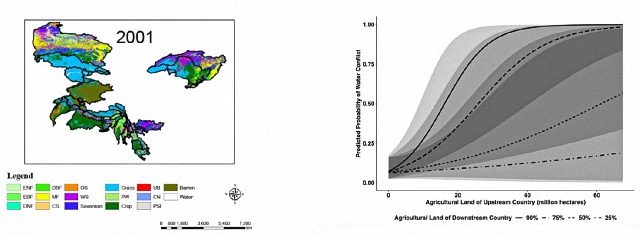Professor Pang Xun of the School of International Studies (SIS), Peking University, recently co-authored a research paper titled “Agricultural Geography and International Water Conflict: Evidence from Remotely Sensed Data”, which has been officially published in International Studies Quarterly (Vol. 9, 2025).
The paper innovatively constructs an analytical framework for geopolitical risks under climate change, systematically examining how the spatial distribution of agricultural land—including location, scale, and spatial patterns—affects the risk of international water conflicts. It captures significant spatial interactions among water resources, agriculture, and climate change, analyzing how they jointly shape complex geopolitical risk patterns. Moving beyond traditional studies that focus solely on geographic proximity, the paper introduces a place-based politics perspective and proposes and tests three causal hypotheses:
1. Cross-border watershed agricultural land scale hypothesis – The scale of agricultural land in riparian countries is positively associated with international water conflict risk.
2.Upstream-downstream asymmetry hypothesis – Expansion of upstream agricultural land exacerbates water stress and bargaining asymmetries within the basin, increasing conflict risk.
3.Upstream-downstream interaction hypothesis – The scale of downstream agricultural land significantly moderates upstream effects.
Methodologically, the study integrates MODIS satellite remote sensing data with a cross-border freshwater spatial database and employs advanced GIS techniques to develop a globally gridded measurement system for agricultural land. This produces spatially explicit agricultural geography indicators, providing objective and precise data support for related research.
The analysis covers 311 country pairs across 58 international river basins over seven years. Key findings include: every increase of 73.759 million hectares in cross-border agricultural land raises the probability of international water conflict nearly 14-fold; the marginal effect of upstream land expansion is especially pronounced, with an increase from 0 to 67.449 million hectares when downstream land is at median levels elevating conflict risk nearly 16-fold; downstream moderation exhibits threshold characteristics, where upstream changes can sharply increase conflict probability once downstream land exceeds a critical value.
The study reveals how resource scarcity imposes pressure on key economic sectors and politically sensitive regions, translating into heightened international conflict risk. The research advances natural resource geopolitics in three ways:
1.It demonstrates how economic geography analysis offers new entry points for international relations theory, extending place-based politics frameworks from domestic to international contexts.
2.The developed measurement methodology can be applied to other IR research areas, including international trade, foreign aid, and climate negotiation.
3.The findings provide a new geopolitical perspective for transboundary water governance under climate change. Importantly, agricultural land itself is not the root cause of conflict but a key indicator of water resource vulnerability. The study emphasizes the strategic significance of establishing spatially based conflict early-warning systems and transboundary governance frameworks in the context of accelerating global climate change.
The paper’s co-first author and corresponding author is Associate Professor He Qingqian (School of Politics and Public Affairs, China University of Political Science and Law). Other authors include Assistant Professor Yanqian He(Department of Geography, Arkansas State University, USA), PhD student Yekai Xu (Department of Informatics, University of Tokyo), and Associate Professor Matthew H. Connolly (Department of Geography, University of Central Arkansas, USA).

International Studies Quarterly is the flagship journal of the International Studies Association (ISA). Its latest impact factor places it in the top quartile (Q1) of SSCI journals in both Political Science & International Relations and Sociology & Political Science. As a peer-reviewed academic journal, it publishes high-quality research with significant theoretical, empirical, and normative contributions to the field of international studies.